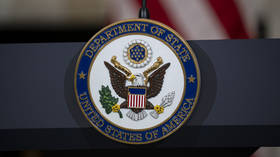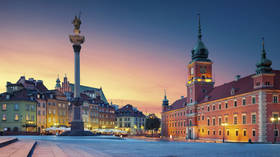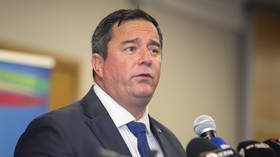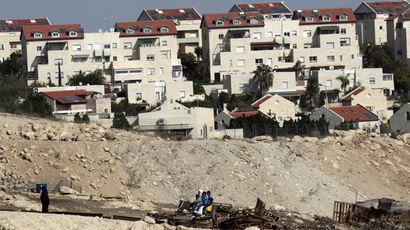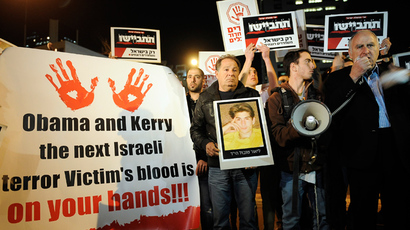Jubilation in Palestine, anger in Israel as prisoners freed
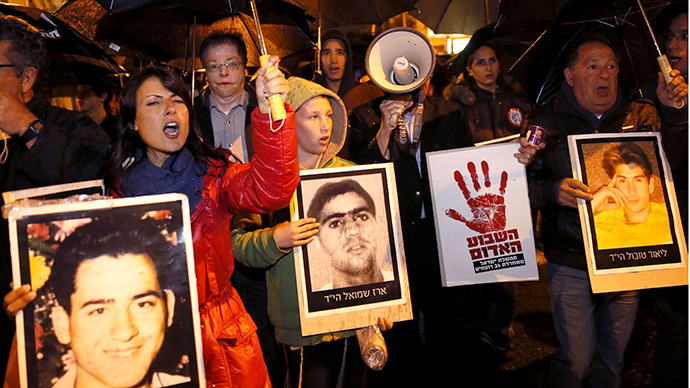
Israel has freed 26 Palestinian prisoners convicted in deadly attacks against Israelis after a court rejected an appeal by the victims’ families to halt the move. The prisoner release is the third of four planned as part of US-brokered peace efforts.
Most of the 26 inmates set free Tuesday were convicted of killing
Israelis and spent between 19 and 28 years in prison. Almost all
were jailed before the Oslo Accords, when the first
Israeli-Palestinian interim peace deals were signed in 1993.
Three of the prisoners were released to the Gaza Strip, 18 to
West Bank and 5 to East Jerusalem.
Ahead of the release, several hundred protesters marched late
Monday from Prime Minister Benjamin Netanyahu's Residence in
Jerusalem to the home of one of the terrorists, shouting:
"Don’t release the murderers!" and "Death to
terrorists!"
A number of streets were closed off due to the rally, organized
by the chairman of the Almagor terror victims association, Meir
Indor.
Passions ran high when the protesters passed by the US Consulate
to rail against President Barack Obama and US Secretary of State
John Kerry, whose efforts helped resume peace negotiations in
July after a three-year break. One man shouted: "Release
terrorists in your own country!” while another added:
"You have no right to put our people in danger!"
"At the end of the day, the release of these terrorists is a
result of the pressure being imposed on Israel by Obama and
Kerry," one of the protesters, Jonathan Benedek, told The
Jerusalem Post. "I don’t believe that any prime minister in
his right mind would willingly release these terrorists or
believe this is a good thing for Israel strategically.”
Despite mass protests, the release of the prisoners was carried
out overnight. Their relatives and supporters gave a heroes’
welcome to the men, celebrating with fireworks.
51-year-old Ahmed Shihadeh, from the Qalandia refugee camp in the
West Bank, spent nearly three decades in prison after being
convicted of the murder of an alleged collaborator with Israel.
For the past two years his mother was unable to visit her son in
prison because she could no longer walk.
"I've visited him in 14 jails. I would leave my kids
screaming and go for a visit," Haseba Shihadeh told AP.
In total, Israel said 104 prisoners would be set free; 52 have
been released prior to those 26 released on Tuesday. The fourth
round of releases is due to take place in April.
Palestinian President Mahmoud Abbas pledged not to sign a final
peace deal with Israel "before all the prisoners are
released."
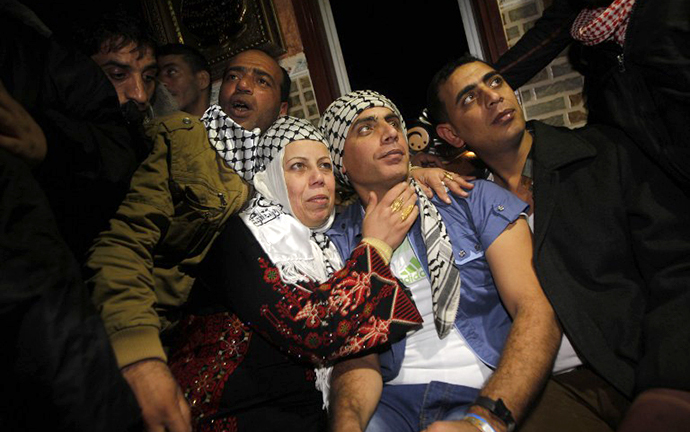
Meanwhile, Israeli Prime Minister Benjamin Netanyahu has come
under fire for his decision to balance out the series of
controversial releases with plans to build 1,400 new homes in
both the West Bank and East Jerusalem.
While supporters of peace talks say the construction will ruin
the goodwill gesture created by the prisoner release, many others
slammed Prime Minister Netanyahu for connecting the Jewish
settlement issue with the release of those they call "murderers."
Settler leader Dani Dayan said the timing of a new settlement
announcement was wrong. "The linkage between the release of
convicted terrorists and the construction in Jerusalem and in
Judea and Samaria puts an unnecessary stain on the
construction."
Palestinians see the settlements (which most countries regard as
illegal), as an obstacle to a viable state they seek in the West
Bank and the Gaza Strip. Israel took possession of those
territories in the 1967 war and pulled out of the Gaza Strip.
The Palestinians have appealed to the US to block the expected
announcement, saying such construction threatens peace efforts.
Both the US and the EU have spoken against settlement plans.
Netanyahu pledged he would not back down, however. "In these
negotiations we are faced with our essential interests, including
guaranteeing the settlements in the land of Israel," he
said.
"Leadership is judged by the ability to implement decisions,
difficult as they may be," Netanyahu told members of his
Likud Party on Monday. "We were not elected to make easy
decisions."
In another move that could also hamper peace efforts, an Israeli
Cabinet ministers committee on Sunday backed a bill that would
annex a section of the West Bank near the Jordanian border to
Israel. Netanyahu insists that Israel must maintain a presence in
the area for security reasons. Abbas rejected the move. "This
is Palestinian land and we will not let them do it," he said
in Ramallah.
The chances are small that the bill will receive parliamentary
approval, however. Israel's chief negotiator, centrist Justice
Minister Tzipi Livni, said she would use all her political
influence to block the legislation from being voted on in
Parliament.




